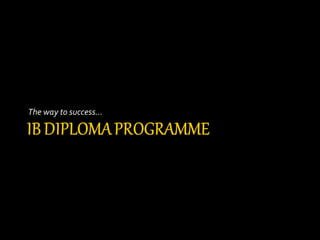
Ib diploma
- 1. The way to success… O. Тiurina, J. Mironova, T. Oglezneva, D. Jurina, A. Patrusheva, M. Ivanova, N. Akulova.
- 2. Organization: What is the IB mission and legal status? Mission Core values to develop inquiring, Motivated by a mission knowledgeable and Partnerships caring young people Quality who help to create a better and more Participation peaceful world through International mindedness intercultural understanding and respect. Legal status The IB is a non-profit making Swiss Foundation registered in 1968. The activities of the organization are determined by an Act of Foundation approved by the Swiss authorities. Page 2
- 3. Programmes : What is the Learner Profile? IB learners strive to be: Inquirers Knowledgeable Thinkers Communicators Principled Open-minded Caring Risk-takers Balanced Reflective Page 3
- 4. Diploma Ages 16 - 19 Student Professional School Curriculum assessment development evaluation Page 4
- 5. Students study concurrently: three subjects at higher level (240 hours each). three subjects at standard level (150 hours each). all three parts of the core. The IB Learner Profile and the core are central to the philosophy of the Diploma Programme. Page 5
- 6. Based on student and teacher interest, course offerings include: GROUP 1 GROUP 2 GROUP 3 HL English A1 SL/HL Language B HL History of Americas (Spanish, French) SL Psychology SL Environmental Systems GROUP 4 GROUP 5 GROUP 6 SL Biology SL Mathematics HL Visual Arts SL Environmental Systems HL Film
- 7. The extended essay: limit of 4,000 words investigate a topic of individual interest independent research and writing skills must include “…techniques appropriate to the discipline” students select topic and work with volunteer instructors in topic area
- 8. The interdisciplinary TOK course: designed to provide coherence by: exploring the nature of knowledge across disciplines encouraging an appreciation of other cultural perspectives Part I – focus on limitations of humans as knowers – perceptions, emotions, languages, reason Part II – development of skills to evaluate knowledge claims in the various disciplines.
- 9. Participation in the school’s CAS program: to be involved in artistic pursuits, sports and community service work awareness and appreciation of life the hours are designed to be on-going; spanning the duration of the Diploma program
- 10. The diploma is graded over 45 Includes both final points giving ample scope to examinations and internal differentiate student ability assessment Marks awarded for each course All 4,000 examiners are ‘quality range from 1 (lowest) to 7 (highest). checked’ Diploma is awarded to students who The IB undertakes random gain at least 24 points. inspections of schools during exams. The overall diploma pass rate is broadly consistent year on year Results are published on 5 July for May session and 5 January for the Diploma Programme assessment – November session. principles and practice – available on www.ibo.org Page 10
- 11. Individual pieces of work produced as part of a course of study. oral exercises in language subjects projects student portfolios class presentations practical laboratory work mathematical investigations artistic performances
- 12. Some assessment tasks marked externally by examiners. world literature assignments for language A1 written assignments for language A2 essays for theory of knowledge and extended essays.
- 13. Externally marked examinations form the greatest share of the assessment for most subjects. The grading system is criterion-based
- 14. The IB works closely with universities in all regions of the world to gain recognition for the IB diploma: Direct online access for university admissions officers and government officials to syllabuses and recent examination papers A database of university admission policies on www.ibo.org Recognition in over 100 countries Recognition by over 2,000 universities Some universities offer scholarships and advanced placement for IB students Page 14
- 15. Universities consider the IB Diploma to be one of the most demanding secondary school curricula, offering ideal preparation for post-secondary studies. A student's participation in IB courses is, therefore, a very important consideration in admission decisions. It is to a student's distinct advantage to have completed IB courses, but especially so if the student is completing the IB Diploma. - CURT (College & University Task Force), July, 2009
- 16. Admissions assumptions: What do universities assume about the IB graduate? Accepts challenges Strong academic foundation Consistency Excellent research & writing skills Excellent critical thinking skills Strong oral presentation skills Community engagement Mature & responsible
- 17. Page 17
- 18. “Through high quality education we create a better world.” Idealistic, peace promoting Culturally aware Quality, standards University recognition & challenge “International and Baccalaureate complementing opposites that make the IB.” Page 18
Notas do Editor
- _____________________________________________________________________________________________________________________________________________________________________________________________________________________________________________________________________________________________
- _____________________________________________________________________________________________________________________________________________________________________________________________________________________________________________________________________________________________
- _____________________________________________________________________________________________________________________________________________________________________________________________________________________________________________________________________________________________
- _____________________________________________________________________________________________________________________________________________________________________________________________________________________________________________________________________________________________
- _____________________________________________________________________________________________________________________________________________________________________________________________________________________________________________________________________________________________
- _____________________________________________________________________________________________________________________________________________________________________________________________________________________________________________________________________________________________
